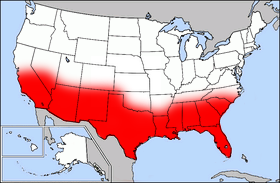| Revision as of 20:17, 15 October 2006 editThomas Paine1776 (talk | contribs)Extended confirmed users, Pending changes reviewers35,556 editsNo edit summary← Previous edit | Revision as of 23:58, 1 November 2006 edit undo207.200.116.10 (talk)No edit summaryNext edit → | ||
| Line 2: | Line 2: | ||
| {{otheruses4|the region of the United States|the American ]|Sun Belt Conference}} | {{otheruses4|the region of the United States|the American ]|Sun Belt Conference}} | ||
| The '''Sun Belt''' is a region of the ] generally considered to stretch across ] and ]. The Sun Belt has seen substantial population growth in recent decades compared to the ] states of the ] and ]. Another rough boundary of the region is the 37th to 38th parallels, north latitude -- southward. The |
The '''Sun Belt''' is a region of the ] generally considered to stretch across ] and ]. The Sun Belt has seen substantial population growth in recent decades compared to the ] states of the ] and ]. Another rough boundary of the region is the 37th to 38th parallels, north latitude -- southward. The Sun Belt experiences problems from ]. | ||
| ], ], ], ], ], ], ] and ] are the states most commonly identified with the Sun Belt, and ], ], ], and ] are also within the same region as far as climate is concerned. Culturally, however, southern states from Texas to Florida are more often referred to as Bible-Belt states, while southwestern states extending to the Pacific coast (New Mexico, Arizona, and California) are most often associated with a life-style synonomous with the Sun Belt. Some people consider ] to be a Sun Belt state because it has seen similar growth, although its climate is slightly more "wintry" than the other states in the group. | ], ], ], ], ], ], ] and ] are the states most commonly identified with the Sun Belt, and ], ], ], and ] are also within the same region as far as climate is concerned. Culturally, however, southern states from Texas to Florida are more often referred to as Bible-Belt states, while southwestern states extending to the Pacific coast (New Mexico, Arizona, and California) are most often associated with a life-style synonomous with the Sun Belt. Some people consider ] to be a Sun Belt state because it has seen similar growth, although its climate is slightly more "wintry" than the other states in the group. | ||
Revision as of 23:58, 1 November 2006

The Sun Belt is a region of the United States generally considered to stretch across the South and Southwest. The Sun Belt has seen substantial population growth in recent decades compared to the Rust Belt states of the Northeast and Midwest. Another rough boundary of the region is the 37th to 38th parallels, north latitude -- southward. The Sun Belt experiences problems from illegal immigration.
Arizona, California, Florida, Georgia, Louisiana, Nevada, New Mexico and Texas are the states most commonly identified with the Sun Belt, and South Carolina, Mississippi, Arkansas, and Alabama are also within the same region as far as climate is concerned. Culturally, however, southern states from Texas to Florida are more often referred to as Bible-Belt states, while southwestern states extending to the Pacific coast (New Mexico, Arizona, and California) are most often associated with a life-style synonomous with the Sun Belt. Some people consider North Carolina to be a Sun Belt state because it has seen similar growth, although its climate is slightly more "wintry" than the other states in the group.
Every elected President of the United States since 1964 has come from a Sun Belt State. (Gerald Ford, born in Nebraska but raised in and primarily identified with Michigan, who served as president after Nixon's resignation, was not elected to the position.) They are:
- Lyndon B. Johnson (1964) -- Texas
- Richard M. Nixon (1968, 1972) -- California
- Jimmy Carter (1976) -- Georgia
- Ronald Reagan (1980, 1984) -- California (originally from Illinois)
- George H. W. Bush (1988) -- Texas (originally from Massachusetts)
- Bill Clinton (1992, 1996) -- Arkansas
- George W. Bush (2000, 2004)-- Texas (originally from Connecticut)
Even more oddly, only one president prior to this was raised in a Sun Belt state—Woodrow Wilson, raised in Georgia—although two others, Andrew Johnson and James Polk, may be counted if North Carolina is included. Dwight D. Eisenhower can be considered as being from a Sun Belt state, as he was born in Texas; however, his family moved to Kansas when he was two years old, and he lived there throughout his childhood before leaving for West Point.
The author and political analyst Kevin Phillips - in an essay entitled "How the GOP Became God's Own Party" that appeared in the Washington Post on Sunday, April 2, 2006 - claims "I coined the term "Sun Belt" to describe the oil, military, aerospace and retirement country stretching from Florida to California," in his 1969 book "The Emerging Republican Majority."
See also
This article about a specific United States location is a stub. You can help Misplaced Pages by expanding it. |
| "Belt" regions of the United States | |
|---|---|
| Main Regions | |
| Religious Regions | |
| Production Regions | |
| Other Regions | |